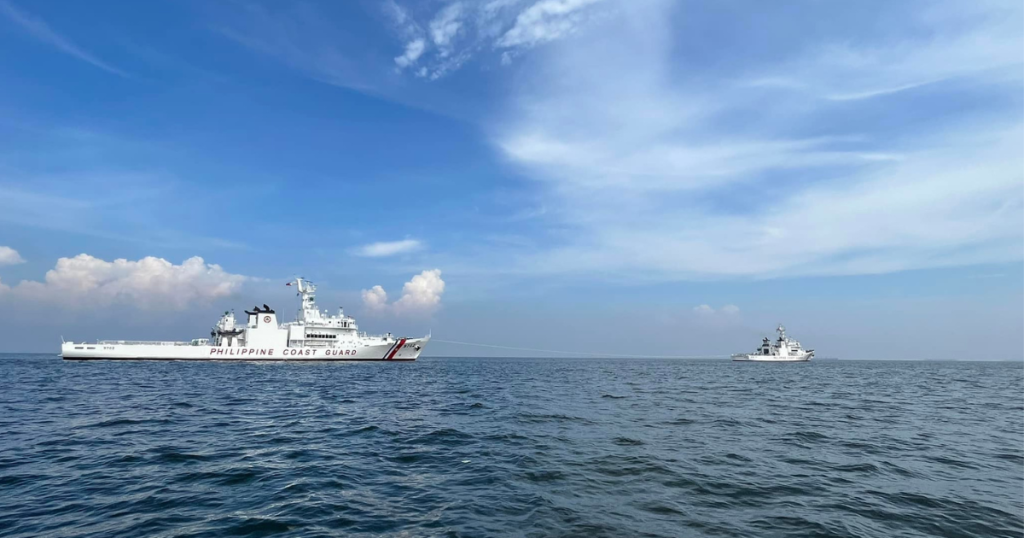Chinese drills in Escoda violate UNCLOS

BRP Teresa Magbanua (MRRV-9701) and BRP Melchora Aquino (MRRV-9702) during a a joint towing exercise at Manila Bay last 2022. Photo from BRPTeresa Magbanua Facebook page.
By Manuel Mogato | Date 06-19-2024
MANILA — China’s People Liberation Army-Navy (PLA-N) conducted significant naval exercises early this month around Escoda Shoal in the West Philippine Sea, a move that subtly exerted pressure on a stationary Philippine maritime law enforcement vessel.
China’s helicopters, hovercrafts, four navy, and two coast guard vessels launched drills for three consecutive days from June 2 in Escoda Shoal.
China has, once again, crossed a red line.
The 97-meter BRP Teresa Magbanua, the Coast Guard’s newest and largest multi-role response vessel (MRRV), has been steadfastly deployed for over a month in Escoda Shoal, standing as a bulwark against Beijing’s planned new island-building in the West Philippine Sea.
BRP Teresa Magbanua had a front-row seat to watch half a dozen Chinese warships, Coast Guard, and militia vessels conduct drills, circling the Philippines’ lone ship.
However, China’s psychological warfare tactics failed to force the Philippine Coast Guard out of the uninhabited atoll, about 123 nautical miles from Palawan.
BRP Teresa Magbanua is a symbol of the Philippines’ resolve to defend and protect its sovereignty, sovereign rights, and jurisdiction of maritime zones.
The Philippines is familiar with China’s tactics in the disputed waters of the South China Sea. It will harass and provoke but will not start a shooting war.
It will attempt to win wars without firing a single shot, using deception, psychological operations, and propaganda.
China’s People’s Liberation Army has also been conducting intense drills around self-ruled Taiwan, sending dozens of aircraft and ships to test Taipei’s readiness to react to Beijing’s provocation.
A top United States military official said the Chinese exercises could be a dress rehearsal for the planned invasion in 2027, the 100th anniversary of China’s armed forces.
China’s leader Xi Jinping has vowed to unify Taiwan with mainland China, the last remaining Chinese territory outside Beijing’s control.
It annexed Tibet in 1951 and before 2000, had regained control over the British crown colony Hong Kong and Portugal-ruled Macau.
It has claimed almost the entire South China Sea, exercising sovereignty in areas that were part of the exclusive economic zones of its smaller neighbors, like Malaysia, the Philippines, and Vietnam.
China has been harassing Malaysian and Vietnamese oil fields and the Reed Bank in the West Philippine Sea.
The Chinese naval drills in Escoda Shoal are an escalation of its activities to assert its illegal and excessive claims in the West Philippine Sea.
Even if Beijing had announced the drills, it should have permission from Manila to hold the naval exercises in the Philippines’ exclusive economic zones.
Earlier, three countries – Australia, Japan, and the United States – held drills with the Philippines in the West Philippine Sea. France also joined a naval drill during Balikatan in sovereign waters.
All of these drills had permission from Manila. It invited these foreign navies to participate in drills outside its territorial waters.
Under the 1982 United Nations Convention on the Law of the Sea, the Philippines has jurisdiction over waters within 200 nautical miles of its coastlines. It has the right to explore, exploit, and extract resources in the West Philippine Sea.
As a signatory to UNCLOS, China should have respected the Philippines’ EEZ and had the courtesy to notify Manila about the drills.
However, China had discarded UNCLOS and insisted on its historical claims based on its updated 10-dash-line. It also threw away the 2016 arbitral ruling in The Hague, which repudiated its 10-dash-line as illegal and without basis.
For instance, the Reed Bank is beyond China’s EEZ. Ayungin and Escoda Shoals are also outside China’s EEZ.
China has disrespected the Philippines by holding naval and coast guard drills around Escoda Shoal. China’s arrogance is beyond comprehension. It has to blatantly violate international law just to impose its 10-dash-line.
The Philippines must not be bullied by this drill. The Philippines must increase its presence in the West Philippine Sea to protect its rights and assert its claims on the South China Sea.
The West Philippine Sea is vital to the country’s food and energy security. The Philippines must also ensure its sovereignty and territorial integrity.
The Philippines may have limited capabilities but it has to show the flag in the country’s EEZ.
Tags: Security
